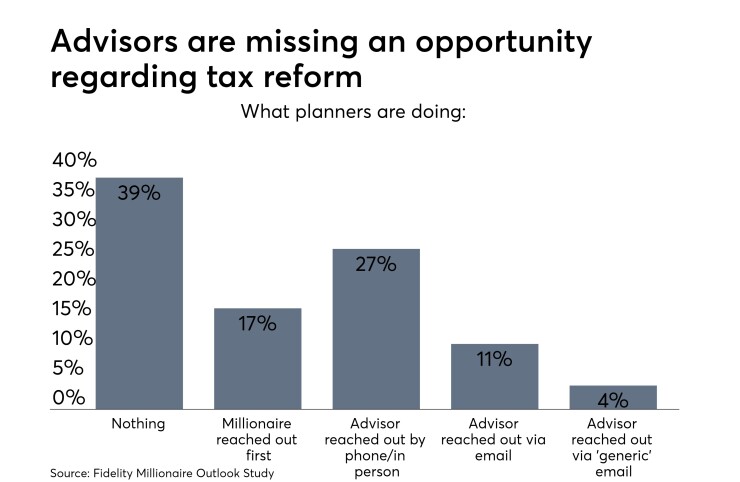High-net-worth clients are looking to advisors for tax help, but in many cases advisors aren’t delivering. And these are clients who can pay.
At least that’s what Fidelity’s recent Millionaire Outlook study suggests, which surveyed more than 1,000 HNW households, including over 600 millionaires.
Over half of the millionaires surveyed said they are willing to pay more for an advisor who is able to help them navigate the recent tax overhaul, while also minimizing their tax bill. In fact, four in 10 millionaires surveyed say their advisors have not proactively reached out to them on the issue of tax changes.
“There were some findings around taxes where I think investors were really pleased with some of the advice they got,” says David Canter, head of RIA advisor segment at Fidelity. “Although it still proves to be an area of opportunity [for advisors]. I would focus on tax reform as being sort of a concrete area that investors are looking for help on.”
Clients may be willing to pay for tax specific advice, but it doesn’t mean advisors are able to give it. Comfort and the level of expertise can play a part in why advisors aren’t discussing tax issues with investors.

“A lot of the reason why advisors are not talking tax strategy, in particular qualified opportunity zone, is it’s complicated,” says advisor Avy Stein, managing partner of Cresset Capital in Chicago, a custodial client of Fidelity. “The other reason is it’s new and the regulations which underpin or interpret the legislation just came out [this month] and there will be more to come.”
It takes a lot of time, effort and understanding across multiple disciplines including private equity and real estate as well as taxes and accounting in order to “truly understand what’s going on here,” Stein says. This could be why advisors are avoiding this subject with clients and can end up hurting themselves by missing the opportunity.
“Taxation for high-net-worth investors is obviously a critical piece of any plan,” says Cresset advisor Nick Parrish. “When you’re talking about 25% to 30% of assets going out the door to the federal government, a thoughtful tax strategy can have a material impact on that.”
To that end, Parrish says Cresset has developed an approach that looks at wealth and investments comprehensively. Meaning the advisors take tax efficiency into consideration when providing investment guidance and return opportunities.
-
The partnership with Intuit allows clients to autofill information from TurboTax filings.
October 23 -
You’ll probably find administrators blocking the backdoor Roth IRA strategy more than anyone else, says Kimberly Foss, planner, author and Financial Planning contributor. That’s when you’ll have to adopt the role of educator, she says.
October 18 -
Think you’ve already optimized client portfolios? Think again.
October 9
“We have built out a full internal tax capability here,” Parrish says. “We have experts in estate tax, business tax, structuring and so we’ve really built an infrastructure to help us think about how to effectively structure that.”
Taking a similar approach in the future might help advisors better serve their clients and it is in looking toward the future that clients have the greatest concerns. Fidelity conducted the survey out of an interest in the attitudes, outlook and sentiment of millionaires to use as a harbinger for what’s happening with other investors within the market.
Investors are bullish on the current market but their future financial outlook is near a record low, the study says. However, investors with an advisor have are more positive on all metrics, including future outlook, than those without, showing how valuable financial advisors can be.
“Advisors are proving their worth,” Canter says, “at least from the survey perspective. Investors feel like they have a plan, that they’ve implemented a plan, they can stick to it and that an advisor is helping them reach their overall life goals.”





